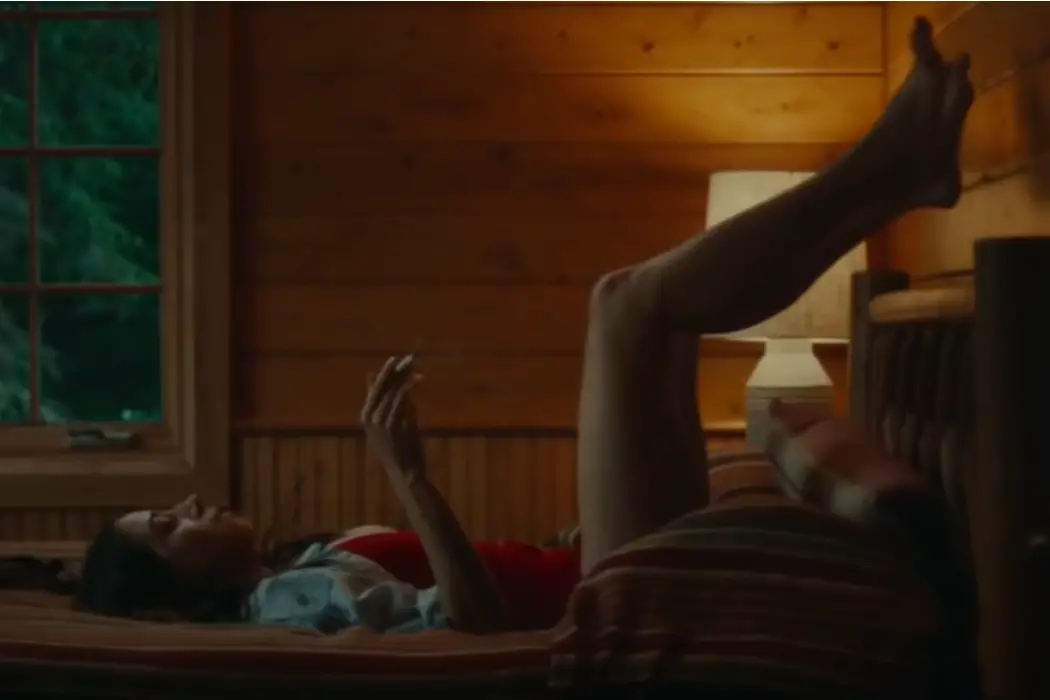BLACK BEAR: Strong Bark, Little Bite

Alex is a film addict, TV aficionado, and book lover.…
The woman on a dock. It’s an image used in cinema so much that it’s basically a cliché, the distant figure nearly always gazing out at the water as if contemplating possibilities, perched on the edge of a choice. It’s an image and a cliché used repeatedly in Black Bear, a mystifying little movie that, for all its obliqueness, has such a firm grasp on cinema’s past that it’s able to get its message through loud and clear.
The film is ostensibly about a writer/director searching for her next project. She’s booked a stay at a couple’s mountain retreat hoping to find inspiration by prodding her own life and theirs, but it turns out she has little need to prod. The couple are already coming apart, and the mischievous filmmaker just needs to give them the slightest push to get them into a state of delicious fodder.
Or everything that takes place is made up in the filmmaker’s head as she sits on that dock, or it’s an intertwining of imagination and memory, or it doesn’t really matter. The plot isn’t really the point of Black Bear, but once you realize this, you’ll likely wonder whether its point is much more than indulgent solipsism.
It’s All In The Experience
Intentionally confusing narratives like this generally make me throw up my hands pretty quickly in regards to figuring out what’s going on, but that narrative disconnect also lets me sink further into any stylistic playfulness that may be thrown my way. Thankfully, that’s something writer/director Lawrence Michael Levine gives us in spades here, using the uncertainty that permeates everything in Black Bear to morph it into the kind of high wire act that constantly teeters on disaster and must race to the end to stay upright.

The rush comes on the back of an excruciatingly glorious opening, one that is all about building discomfort and awkwardness. The early scenes of the filmmaker and the couple broaching and backing away from a blowout fight are squirm-worthy verbal tap dances, which Levine, with his firm grasp on visual storytelling, caps off with a literal dance.
The contrast between these patient early scenes and the explosiveness that comes later (which Levine also emphasizes with a metaphor, although thankfully that one’s alluded to instead of shown) does much to ensure that the teasing film stays lively instead of frustrating, and one can’t deny that taking in Black Bear comes with that rare thrill of never knowing where it will take you next.
But Why Are We Here
Perhaps such an experience is enough for you, but this goes to such uncomfortable places that I desire a bit more than a visceral experience for the cost of sitting through its unpleasant material. And the point is there, Levine isn’t making such clear references and centering a filmmaker for nothing. Black Bear is about the filmmaking process at its worst, delving into the price some people are willing to make themselves and others pay in order to make something great.

That people go to these lengths isn’t going to shock anyone familiar with the history of filmmaking. From Hitchc*ck having Tippi Hedren attacked by live birds to Kubrick pushing Shelley Duvall to near breaking for The Shining, the innumerable instances of toxic on set environments being created in the name of great art is a bane on the industry, one that, given the continuous reporting of new instances, hasn’t yet been adequately addressed.
So to simply observe that filmmakers do really messed up things isn’t much to hang a film on, and if Levine is trying to address more subtle costs, like the discomfort of mining you and your loved ones’ pain for mass consumption, then it goes way too far in its presentation. Given the craft on display, I have trouble imagining that the depths Black Bear goes to is a miscalculation, which means Levine is guilty of the very solipsism that his own film bemoans.
Plenty Of Prowess
Even though there’s not much to Black Bear, the skill with which Levine steers this whole project is impossible to deny. There’s a lot of great filmmaking on display here, especially since the movie shifts so often that everyone involved had to deliver in three or four different ways, and then it all had to somehow mesh together.

For instance, cinematographer Robert Leitzell starts out having to capture a contained chamber piece then build to a weirder, more heightened style until every moment feels like something is about to blow. The way he moves from steady coverage to a roaming, jittery camera is a perfect escalation, one that’s nicely mirrored by a score that is at first spare but increasingly becomes more intrusive.
It’s the actors, though, that are asked to do the most gymnastics. Aubrey Plaza, Christopher Abbott, and Sarah Gadon must navigate wordy, loaded scenes and moments of quiet intensity, the dynamics between the trio switching around so often that it’s a wonder they’re able to hold their characters together. But as great as Abbott and Gadon are, this is undoubtedly Plaza’s movie, with Levine finding a chilling new use for her unreadable expressions. She’s been expanding her repertoire for the past few years, but this requires her to go to places completely devoid of the deadpan facade she usually has up, the rawness coming with its own indecipherability.
For Plaza, along with almost everyone involved, this strange movie allowed them to go all out, and they succeeded in ways that’ll make you remember their accomplishments.
Conclusion: Black Bear
Black Bear goes to such lengths to get across a mundane idea that even its lack of meaning is forgivable in light of its wild viewing experience. Everyone involved takes advantage of the showcase, and there’s worth in seeing just how far this skilled team can stretch themselves, but you’ll likely only remember those pieces of individual excellence while the whole of the movie will slip weightlessly away.
What did you think of Black Bear? Please let us know in the comments below!
Black Bear will be available for stream and in limited theaters on December 4, 2020
Watch Black Bear
Does content like this matter to you?
Become a Member and support film journalism. Unlock access to all of Film Inquiry`s great articles. Join a community of like-minded readers who are passionate about cinema - get access to our private members Network, give back to independent filmmakers, and more.
Alex is a film addict, TV aficionado, and book lover. He's perfecting his cat dad energy.













